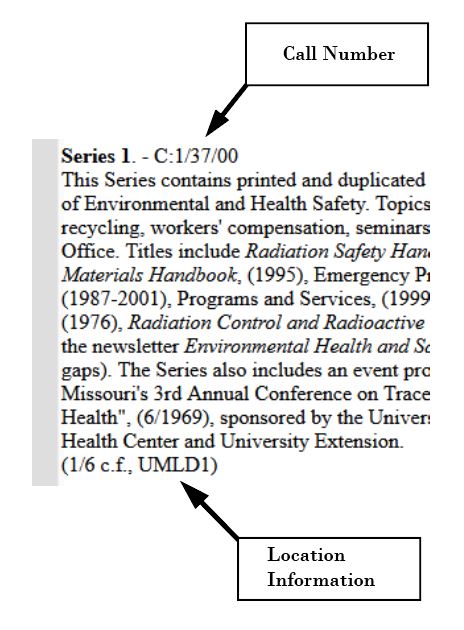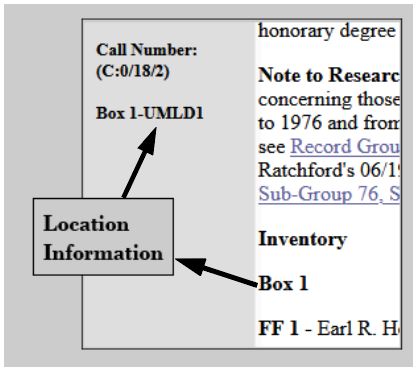Using Finding Aids
Using University Archives Finding Aids
Materials from the holdings of the University Archives can, under normal circumstances, be made available by Archives' staff for patrons to examine and study in the Archives' Reading Room. Patrons can access finding aids (i.e., means of identifying material within a collection) from the Archives' web site (https://muarchives.missouri.edu/). The finding aids are available on the web and can be reviewed or queried via the site's search feature.
The basic web search method is a keyword search. A word (or words), including personal names, specific to one's research area can be entered in the search box. The links resulting from the search can then be followed to read the descriptions of the materials and determine the relevancy of the materials.
Call numbers or collection numbers and location information of materials are required to request items. A call/collection number is of the form C:31/00/1 or UW:1/141/1. Location information is often in the form of a six-digit number (e.g., 012345) or numbers/letters separated by commas (e.g., B3A, B5, 1).
Another method of identifying material within the Archives' holdings is to use the 'office of origin' or provenance approach. The Record Group list for the University of Missouri Campus, available at the following URL, Record Group List - Campus, orders the various University offices and departments into Record Groups and Sub-groups. The Office of the Provost, for example, is a Sub-group under the larger Record Group "Administration of Columbia Campus."
For example:
The call number notation C:1/32/1 indicates (from left to right) the following:
C -- that the record group belongs to the University of Missouri-Columbia campus as opposed to the entire University System, which is indicated by 'UW'
1 -- Record Group 1, that is "Administration of Columbia Campus."
32 -- Sub-group 32, that is the Office of the Provost.
1 -- The first accession processed under this Sub-group.
If a Record Group or Sub-group has been identified as the producer (i.e., creator) of materials that may be relevant to one's research or interest, the next step is to 'translate' the call number (e.g., C:1/32/1) into the location where the material is described on the web site. To do this one needs to use the Kardex Concordance located at the following URL: Concordance
In the Concordance (either the 'C' or the 'UW' listing) one scrolls through the list until one finds the record group and sub-group one is interested in. At that point, one can click on the links to go to the descriptions (either summaries or full inventories) of the material in that particular collection. Remember that in the call or collection number, the third number shows only the sequential order in which collections were placed in the specific Record Group and Sub-group. Therefore, continuing the above example from the Office of the Provost, any call number or collection number with C:1/32/ will refer to material in some way originating in or with the Provost.
The descriptions (either summaries or full inventories) can also be browsed within a specific Record Group by following the appropriate Record Group link at this URL: Holdings by Record Group.
Once materials have been identified for study by the patron, a member of the Archives' staff needs to be contacted, either by email (Public Services Archivist) or phone (573 882-7567) so that a mutually-agreeable time can be set up to study the materials. Remember that a call number or collection number and location information is needed to request archival material. In most cases, Archives' staff will require 48 hours to have the materials ready for use.
Materials do not circulate, but copies may be provided within the limitations of the U.S. copyright law and the condition of the materials. For more information on photocopying and duplication, including cost and copyright, follow this link: Duplication.
Part or all of some collections may be restricted to protect privacy or other legal rights.
Unprocessed or partially processed collections may not be available for research until processing has been completed.

